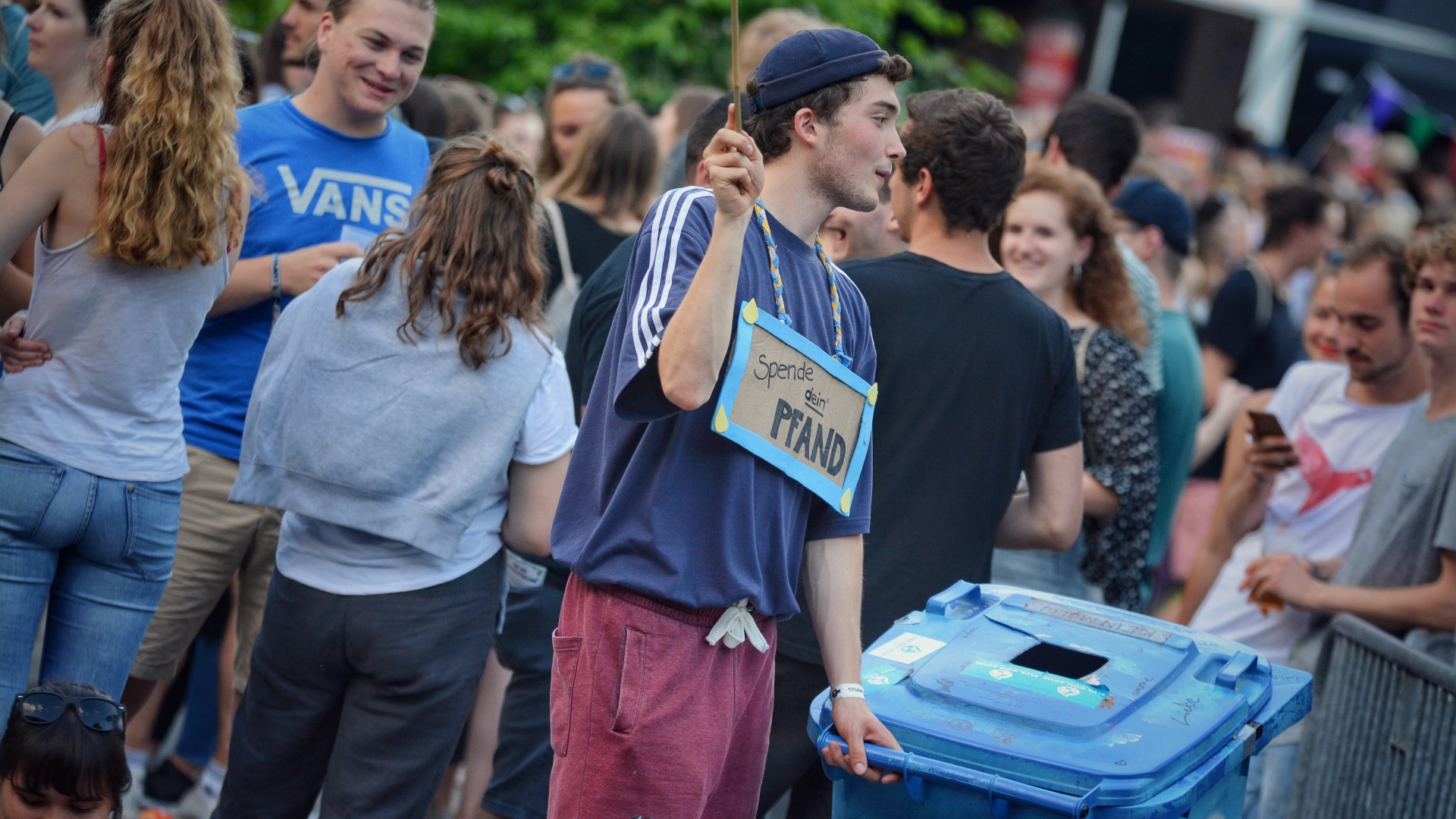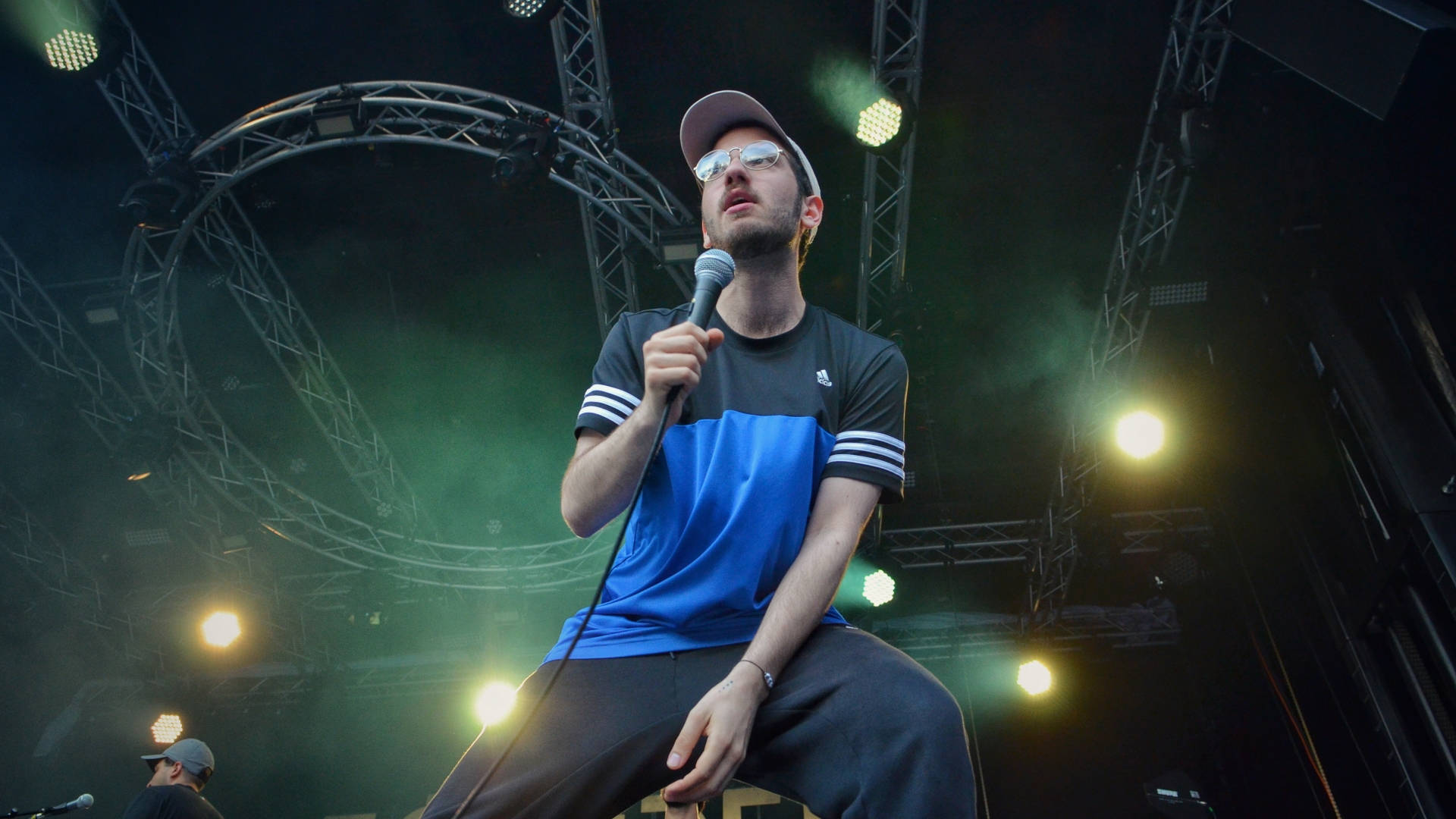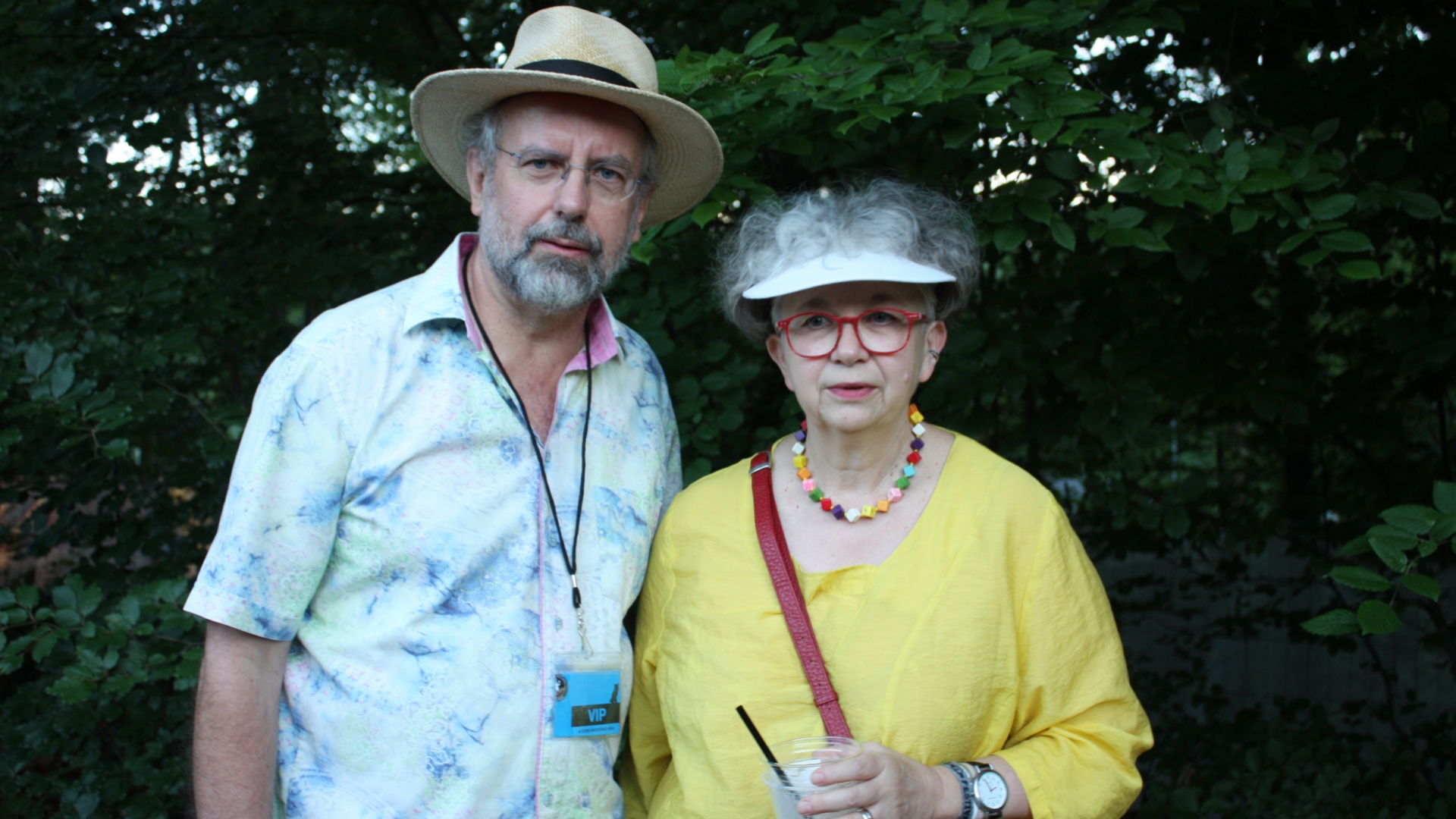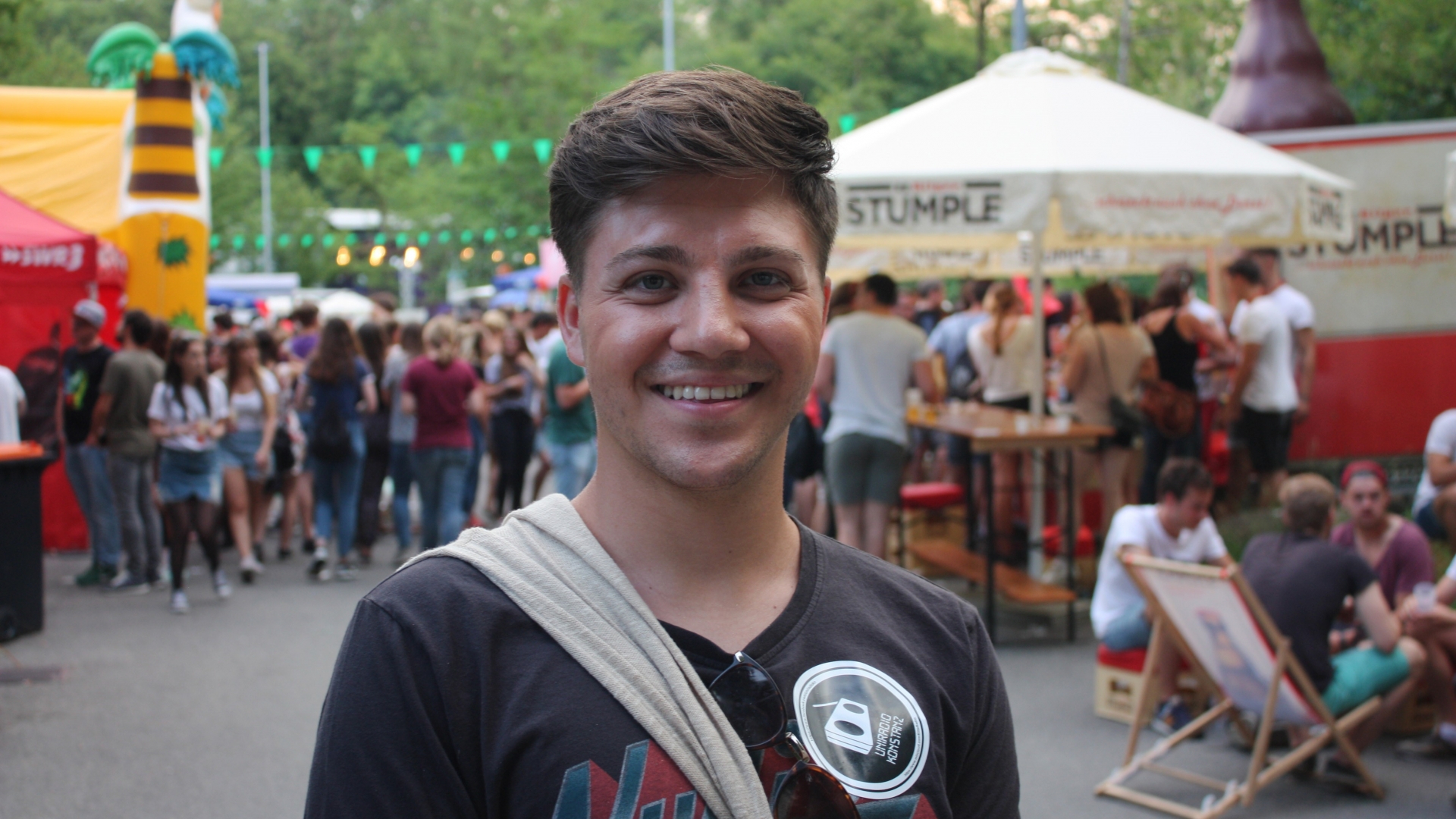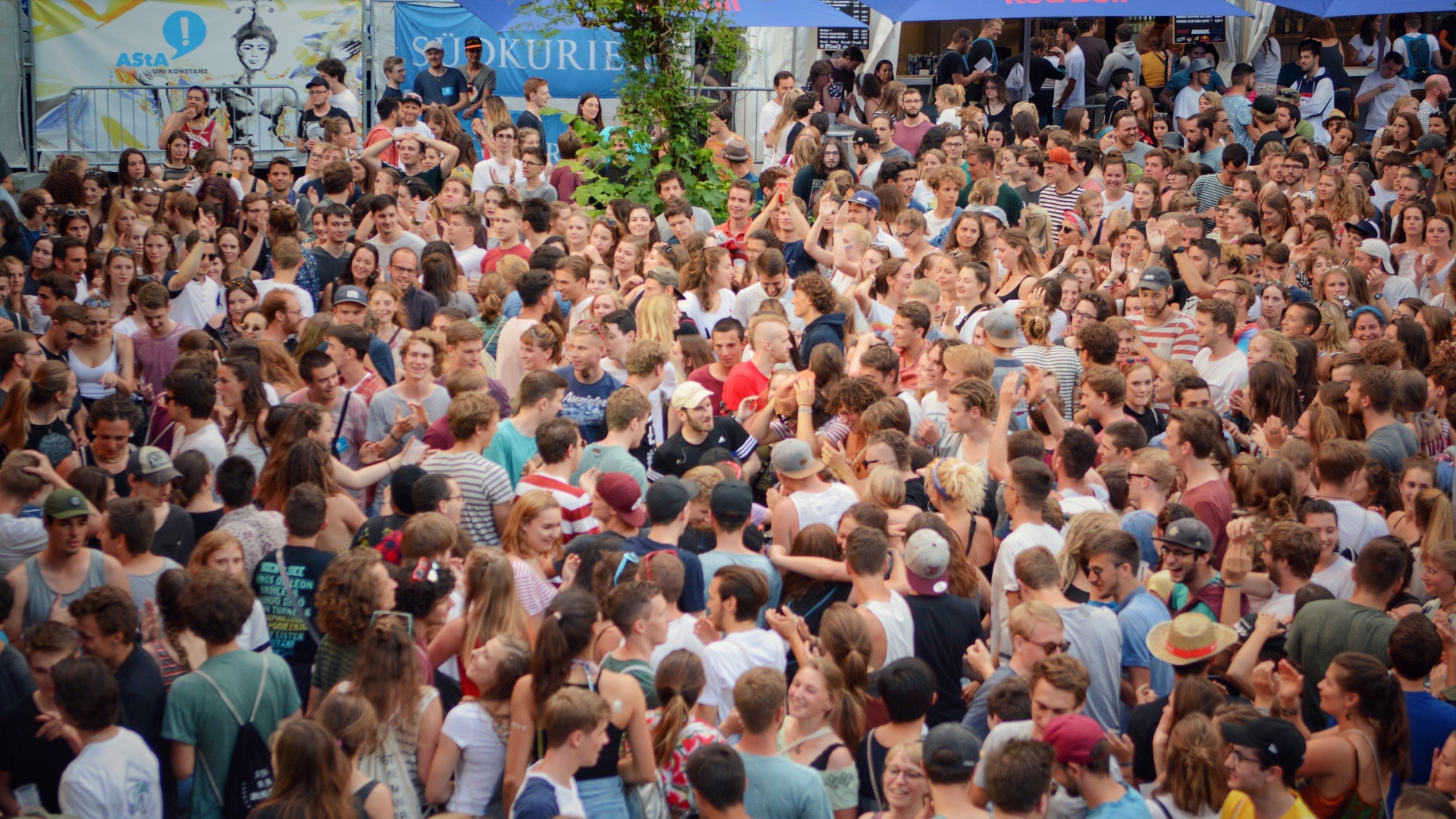- 1“Escaping the routine”: A journalistic appraisal of the 2018 Campus-Festival at the University of Konstanz
- 2A projectseminar in LKM
- 3Portrait Humpenöder
- 4Two voices for the seminar
- 5Abstract from the festival-newspaper
- 6Support from the subject area
- 7Quote junior scientist
- 8Impressions
- 9Transfer in teaching
- 10A new view on the study course
- 11Videointerview
- 12New start for the seminar
- 13CAMPUS FESTIVAL 2019
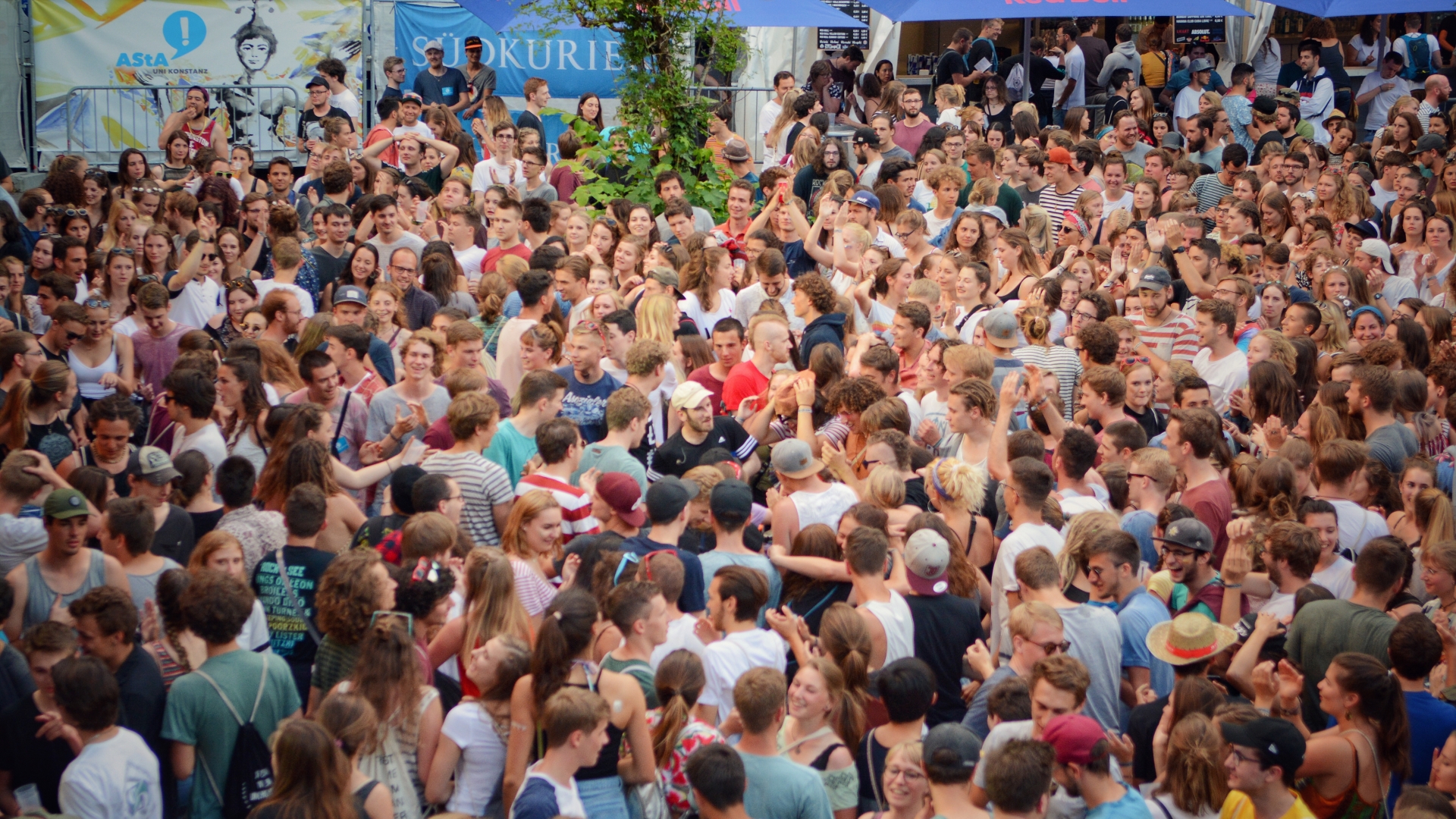
“Escaping the routine”: A journalistic appraisal of the 2018 Campus-Festival at the University of Konstanz
Neon red and dark blue on white – this is how the students’ commemorative publication about the 2018 Campus-Festival makes a lasting impression on the reader: This is not an ordinary seminar project. To realise their publication project, students from the Literature-Art-Media (LKM) bachelor’s programme jumped barriers and drifted past jellyfish lanterns to record impressions, climbed the cloud rap crest and learned what it means to optimise visitor flows.
The students talked with the musicians, interviewed visitors and looked the many student helpers over the shoulder while they worked. “The LKM programme has a strong focus on theoretical discourses in literature, art and media studies. That’s why I wanted to give students the opportunity to ‘go into the field’ – in other words, to approach people and ask questions and write and revise text with notebook, pen and camera in hand,” says seminar instructor Urs Humpenöder about the project’s origins.
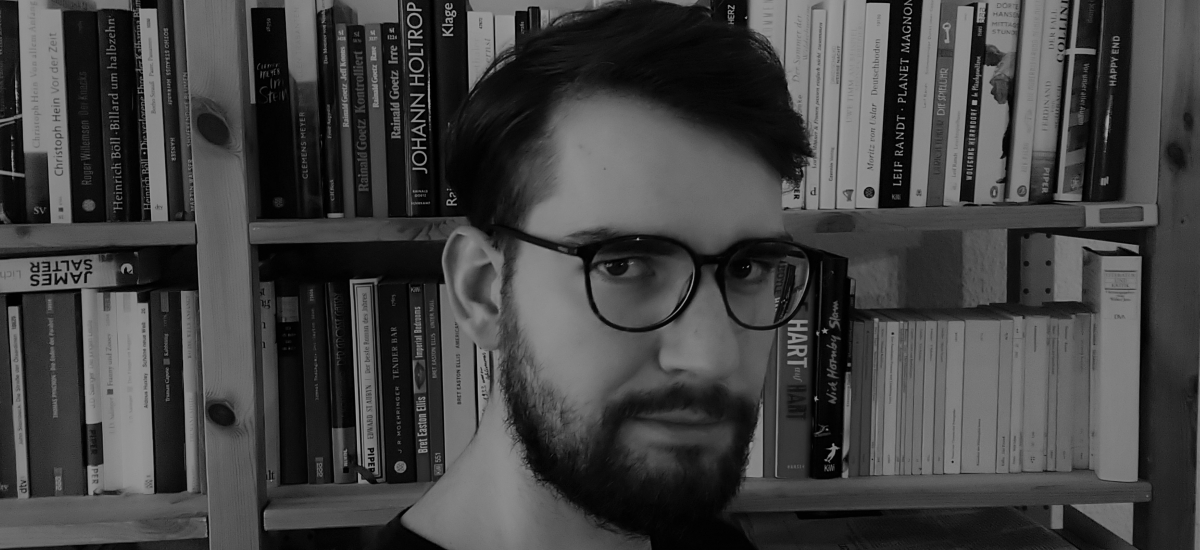
Urs Humpenöder is a lecturer and doctoral candidate at the Department of Literature, Art and Media Studies of the University of Konstanz. His dissertation on the possibilities to carry out critique on digital cultures is being supervised by Professor Beate Ochsner and Professor Bernd Stiegler. Before beginning his doctoral research, he studied cultural studies, literature and media studies as well as journalism in Dortmund, Hildesheim, Konstanz and Leipzig. Humpenöder works as a freelancer for Südwest Presse and as a freelance journalist for the German Press Agency (dpa).
His concept and approach was successful, as Lara Kiolbassa, an LKM student in her fifth semester, relates: “What I really liked about this project seminar was that we were allowed to work independently and contribute our own ideas. This ‘trial and error’ aspect was a part of our experience from the very beginning”. She and her fellow student Lukas Lautenschlager interviewed the Students’ Union representative and his deputy about the future of the Campus-Festival for the commemorative publication and reported on the work of the student assistants.
Lukas Lautenschlager, who now studies sociology and German literature, is also enthusiastic when he thinks back on his experiences: “Not only were we able to visit the festival for free, but we also had access to the backstage area. There were so many different aspects that we had to cover, but at the end of the day, we came together to create something that we could show off”.
Their joint efforts lead to a unique publication that captivates with its fresh approach and striking appearance, cleverly combining various journalistic presentation formats and perspectives on the Campus-Festival.
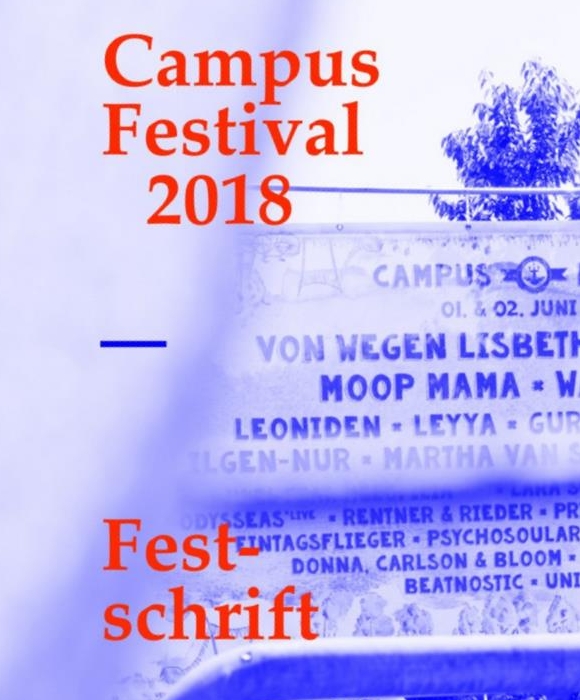
(Only in german)
Auszug aus der Festschrift
... Xhavit Hyseni wartet.
Mit ihm warten drei Polizisten, ein Sanitäter, der Chef einer Sicherheitsfirma, mehrere Mitarbeiter der Universität. Die Männer warten unterhalb des Parkplatzes Nord, dort, wo am nächsten Tag das Campus Festival stattfinden soll.
Sie warten auf Christine Barth, stellvertretende Abteilungsleiterin für Gewerbe und öffentliche Sicherheit bei der Stadt Konstanz. Sie ist es, die letztlich entscheidet, ob das Campus Festival zum vierten Mal stattfinden kann.
Von ihrem Okay hängt alles ab.
Xhavit und sein Team sind vorbereitet. ....
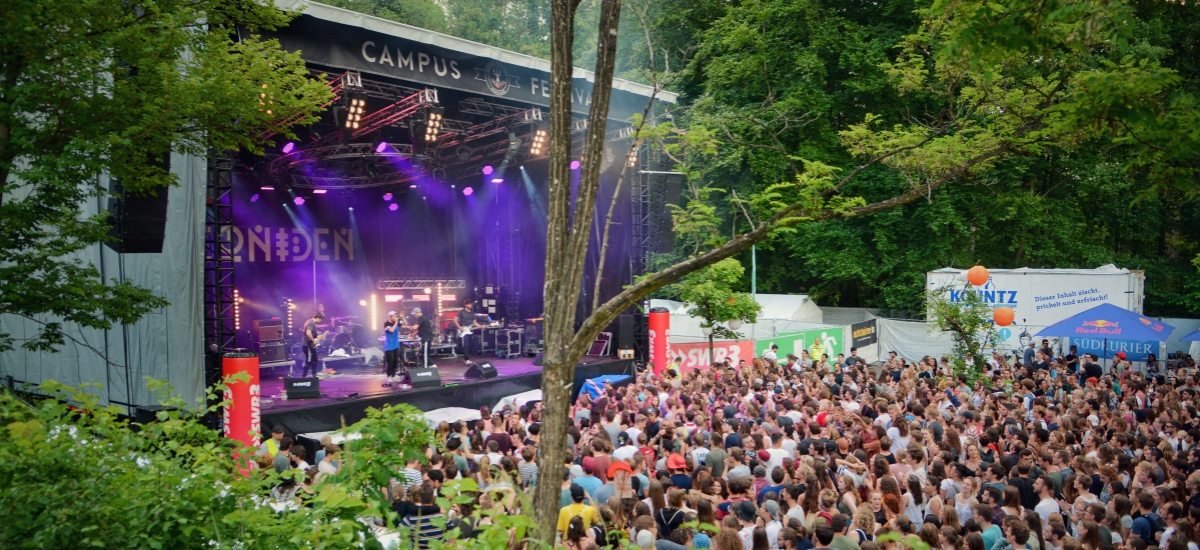
As successful as the project may have turned out, it wasn’t actually that easy to get off the ground. But Urs Humpenöder explains that he received extraordinary support from his department: “My doctoral thesis supervisor, Professor Beate Ochsner, was very, very supportive.
She was convinced by my concept and she generally supports the use of unconventional curricula. This provides us early career researchers more leeway to try something different or entirely new. Hopefully, our students also benefit from this approach”.
“This provides us early career researchers more leeway to try something different or entirely new. Hopefully, our students also benefit from this approach”.
The project team was not only confronted with challenges during the actual festival, such as interviews being cancelled at the last minute. “Adapting the various photographic and written contributions into a beautifully designed, printed booklet also took a lot of time and effort,” says Humpenöder. Another very challenging aspect was raising the appropriate funding for their publication’s graphic design and printing. The Transfer in Teaching project at the University of Konstanz ultimately supported and funded their project.
We asked Sybille Mühleisen, the coordinator of transfer activities in teaching at the University of Kontanz, why this project in particular was supported: “On the one hand, our Campus-Festival is an event organised by our students. We are happy to support initiatives that are organized by them,” says Mühleisen. “The way in which the project utilised the commemorative publication to carry out and experiment with journalistic work, on the other hand, is exactly what we understand transfer to be. Although we always keep sustainability in mind, we therefore decided to support the printing of the booklet”.
Since January 2017, the University of Konstanz is proud to support lecturers and students with devising, organising, financing and carrying out projects that bring together institutions and individuals from both academic and non-academic contexts. Sibylle Mühleisen and Dr Albert Kümmel-Schnur are more than happy to assist with the development of such projects while helping to complete applications and streamline production cycles and communications habits.
In this way they create an added value for all those involved: Students stand to learn how to practically apply the knowledge they gain during their university studies. Lecturers may discover new areas of interest and generate new research questions. External partners will profit from students’ creativity and curiosity and, by working with the lecturers, gain new insight into their own activities. Sybille Mühleisen explains the advantages as follows: “Transfer in teaching is about the desire to experiment, about escaping the routine.
Transfer-oriented teaching is a different form of teaching. It provides an experimental space that allows participants to think about and interact with research, teaching and transfer all at the same time. In Konstanz, we don’t carry out these three activities individually, but we combine them and let them inspire each other. This is what makes our work so exciting”.
Participating students provided very positive feedback about the project. That which was most appealing to Emily Vöckler, a LKM student in her sixth semester, was the fact that participants were assigned sole responsibility for the content of the publication. She was, for example, responsible for interviewing the bands Moop Mama and Leoniden. “Having so much freedom to make your own decisions is exciting. [...] But this experience has shown me that you don’t have to be afraid of responsibility. If you really enjoy a project, then you want to take on responsibility and make the best out of it”.
This confirms what Sibylle Mühleisen believes about transfer-oriented teaching. From her experience, working outside the seminar room allows students to strengthen their belief in their ability to meet challenges, especially in regard to their field of study: “The knowledge they gain as a result of this is not just based on theory anymore, but is actually tested in practice”. Learn more about how Emily Vöckler, Lara Kiolbassa and Lukas Lautenschlager experienced this process and their work during the Campus-Festival by watching the video clip.
Did Urs Humpenöder himself learn anything new as a teacher? Absolutely: “Organising the seminar was –- admittedly – a bit chaotic. At the beginning of the summer semester it was not yet clear whether or not the students would be able to report about the Campus-Festival. I had written to Xhavit Hyseni, one of the organizers of the festival, and talked to him on the phone several times. He was convinced of the idea, but was not able to give us the go-ahead. By the time we had our second seminar session, we got the green light”.
A clearer seminar framework might have helped speed up this process, said Humpenöder. “But it was important to me that my students were free to select their topics”. The opportunity to further optimise the process is on the horizon: Urs Humpenöder has since developed his seminar further and will offer it again in the upcoming summer semester – this time with the sole focus on the Campus-Festival and as a course providing transferable skills credits, as was originally conceived. This means that, in the future, it will be open to all those who are interested, not just LKM bachelor’s students.
The next edition of the commemorative publication is also planned.
Please note: The 2019 Campus-Festival will take place on 31 May and 1 June 2019 in the Uni-Wald (university woods). The event programme includes artists such as RIN, OK Kid, MEUTE, Fil Bo Riva, Laing, Amilli, Mavi Phoenix, BLOND, Heimlich Knüller, Giorgia Angiuli, Monkey Safari and many more. Additional information about the festival and tickets is available here: https://campusfestival-kn.de/.
Copyright of the used photographs:
Header-photo: Campus Festival
Photo page 3 from Urs Humpenöder: Kornelius Friz
Photo page 6: Campus Festival
Photos of the photogallery:
1. Campus Festival
2. Campus Festival
3. Janina Weiss
4. Katharina Binder
5. Campus Festival
